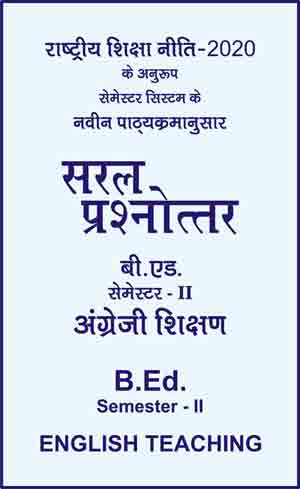|
बी एड - एम एड >> बीएड सेमेस्टर-2 अंग्रेजी शिक्षण बीएड सेमेस्टर-2 अंग्रेजी शिक्षणसरल प्रश्नोत्तर समूह
|
5 पाठक हैं |
||||||
बीएड सेमेस्टर-2 अंग्रेजी शिक्षण - सरल प्रश्नोत्तर
Question- Discuss the place of English after independence.
Or
“In free India, the importance of English is more than what it was used to be in the British India.” Justify the statement.
Ans.
Place of English after Independence :- With the independence, a controversy began about the place, importance and study of English language. Some people favoured its retention. On the other hand some nationalists strongly advocated that English language should quit India with the English. They argued that English was a foreign language and was responsible for a very great waste of student’s time and energy. They declared that students could learn and express their thoughts more easily in their mother tongue. All these persons advocated that English could not be allowed to occupy the position of privilege. In independent India a revolt against English has set in motion. For this a number of causes are responsible which are marked below :-
• Lack of utility of English in everyday life.
• Defective teaching methods.
• Ignorance of vernacular.
• Affection with regional languages.
• Doubtful educational policy.
• Last but not least, regards towards the nation, i.e. feeling of nationalism and patriotism.
Consequently, it was decided that :-
— Hindi in Devnagri script was declared the official language of the Union by Indian Constitution.
— English was declared to continue as an associate language for fifteen years after the declaration of constitution.
— English did not have the same place after independence which it had before independence.
— Independent India must have its own national language.
— English can not become the medium of instruction.
— Regional languages should become the medium of examination.
— English ceased to be a compulsory subject.
The anti-English view may be based on a solid foundation. It may have numerous strong supporters as it actually has. But we can’t ignore the fact that by being learnt and spoken for the last 150 years, English has become the language of Indians to a great extent. Moreover, English has served Indians in several ways. It was taught them to love freedom and democratic ways of life. It has joined them into a single community. It has enabled them to take an advantage of western scientific researches and inventions.
First Prime Minister of India, Pt. J.L. Nehru accepted the importance and influence of English and said, “It is only English through which we can establish social, economic, cultural and political relations with other countries of the world. It opens a wide window of international relations for us. If we close this window, we will shut ourselves up in the four walls of our nationality. This will certainly bring about our decay and downfall, because modern science has reduced the vast dimensions of the globe to the size of a small ball. Under such circumstances we can’t ignore English. We should give Hindi the place of national language. But this never means that English should be completely eradicated from the Indian curriculum.”
Thus we observed that after independence there was a debut between nationalist and modernist for the position of English. Great leaders like Mahatma Gandhi, focussed on regional and national language. But another group of leaders including C. Rajagopalachari favoured for English. Due to both streams place of English is a matter of confusion. Today its position is not official very much. In urban areas, corporate sectors, English is dominant whereas regional languages have great influence in rural India. Now English was declared as associate language for only 15 years i.e. upto 1965. But it couldn’t be replaced by national language till today, i.e. English is present and stay in daily routine of Indians.
|
|||||













